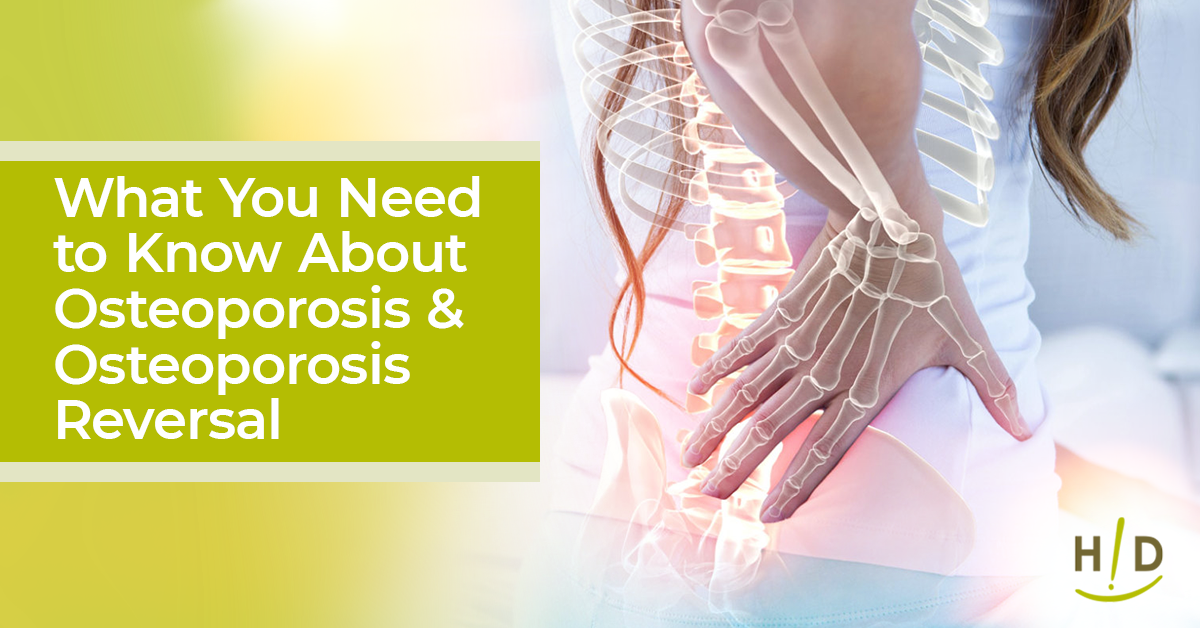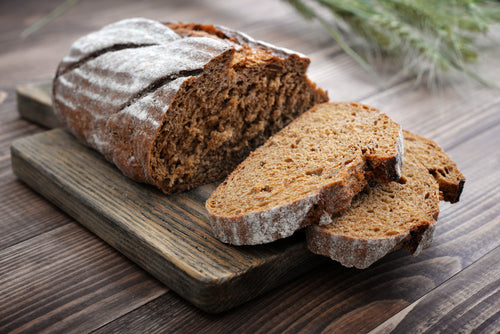Osteoporosis has become a major public health problem with an estimated 10 million Americans living with this condition. People affected by osteoporosis have low bone density and diminishing bone mass. Rates of osteoporosis run highest in women over 50, though men can also be affected. Over time, the gradual loss of bone density can make the bones more susceptible to fractures, particularly in the hips, wrists, and spine. Fortunately, there are natural ways to prevent osteoporosis from getting worse and which can even reverse the damage that’s been done. Read on to learn more about osteoporosis and ways to help reverse osteoporosis.
 The blood’s pH level has a tremendous impact on bone health. The pH scale runs from zero to 14, with zero being highly acidic and 14 being the highest alkaline level. The body’s health thrives when blood pH levels run slightly higher than seven, which is considered more alkaline than acid. The body works hard to maintain a slightly alkaline 7+ pH level in the blood to the point where it will leach whatever materials it needs from cells, tissues, muscles and bones to maintain it. Today’s Standard American Diet of high fat, low fiber, and high sugar is acidic and causes a low level of metabolic acidosis, which is counteracted by the kidneys, first by using glutamine from muscle proteins to produce ammonia to neutralize the acid. Over time the kidney function becomes impaired and mineral balance is compromised. Blood pH rises slightly and calcium carbonate from your bones is required to keep the pH balanced. Since maintaining the pH of the blood is more important for your survival today than the minerals in your bones for your stability when you are much older, your body slowly steals from one part of your body to pay another part. Changing over to a whole food, plant-based diet stops the metabolic acidosis and support healthy kidney function so that it can keep your minerals in balance. An alkaline diet consists of low fat, high fiber, low sugar foods, such as vegetables and fruits, and complex carbohydrates like organic whole grains and legumes. When the body receives the nutrients it needs, osteoporosis reversal becomes inevitable.
The blood’s pH level has a tremendous impact on bone health. The pH scale runs from zero to 14, with zero being highly acidic and 14 being the highest alkaline level. The body’s health thrives when blood pH levels run slightly higher than seven, which is considered more alkaline than acid. The body works hard to maintain a slightly alkaline 7+ pH level in the blood to the point where it will leach whatever materials it needs from cells, tissues, muscles and bones to maintain it. Today’s Standard American Diet of high fat, low fiber, and high sugar is acidic and causes a low level of metabolic acidosis, which is counteracted by the kidneys, first by using glutamine from muscle proteins to produce ammonia to neutralize the acid. Over time the kidney function becomes impaired and mineral balance is compromised. Blood pH rises slightly and calcium carbonate from your bones is required to keep the pH balanced. Since maintaining the pH of the blood is more important for your survival today than the minerals in your bones for your stability when you are much older, your body slowly steals from one part of your body to pay another part. Changing over to a whole food, plant-based diet stops the metabolic acidosis and support healthy kidney function so that it can keep your minerals in balance. An alkaline diet consists of low fat, high fiber, low sugar foods, such as vegetables and fruits, and complex carbohydrates like organic whole grains and legumes. When the body receives the nutrients it needs, osteoporosis reversal becomes inevitable.
 Vitamin K2 activates the protein osteocalcin in your bones that forms cross-links in the crystalline bone structure. It can be likened to rebar in concrete, preventing brittleness and increasing its strength. Vitamin K2 may not increase bone density, but it does improve its structure so that it resists fractures. To get vitamin K2 you can eat a serving of certain fermented vegetables every day. If you are not getting your K2 that way, consider using the Hallelujah Diet Vitamin D3/K2. Getting adequate vitamin C and magnesium, boron, vanadium and other bone-building minerals are also critical. They can be found in green leafy vegetables. All in all, taking steps to manage the controllable risks associated with osteoporosis can go a long way toward keeping the bones healthy and strong. An alkaline diet, weight-bearing exercise, and a quality vitamin D3 / K2 supplement provide the body with what it needs to rebuild bone mass. The good news is osteoporosis reversal is possible when the body gets the help it needs!
Vitamin K2 activates the protein osteocalcin in your bones that forms cross-links in the crystalline bone structure. It can be likened to rebar in concrete, preventing brittleness and increasing its strength. Vitamin K2 may not increase bone density, but it does improve its structure so that it resists fractures. To get vitamin K2 you can eat a serving of certain fermented vegetables every day. If you are not getting your K2 that way, consider using the Hallelujah Diet Vitamin D3/K2. Getting adequate vitamin C and magnesium, boron, vanadium and other bone-building minerals are also critical. They can be found in green leafy vegetables. All in all, taking steps to manage the controllable risks associated with osteoporosis can go a long way toward keeping the bones healthy and strong. An alkaline diet, weight-bearing exercise, and a quality vitamin D3 / K2 supplement provide the body with what it needs to rebuild bone mass. The good news is osteoporosis reversal is possible when the body gets the help it needs!
The Damaging Effects of Osteoporosis
The literal definition of osteoporosis, “porous bone,” aptly describes this condition. When bones start to lose their density, pores or holes develop in areas where bone loss has occurred. This causes bones to become weak and brittle, which greatly increases the risk of breaks and fractures. Osteoporosis produces no symptoms and tends to become especially prominent after the age of 50. Bone breaks and fractures can cause loss of mobility, chronic pain, depression, and even disability. Amazingly, in the case of hip fractures, an estimated 24 percent of people over the age of 50 who experience hip fractures die within a year of having the fracture.Osteoporosis Risk Factors
Both uncontrollable and controllable risk factors contribute to your risk of developing osteoporosis. By the age of 30, bone density levels have peaked, so bones mass decreases from that point on for everyone. Having a family history of osteoporosis is also an uncontrollable risk factor. If you’ve experienced fractures in the past, weak bones may already be an issue you can’t control. On the other hand, controllable risk factors can be managed, meaning there are things you can do to regain bone mass and promote osteoporosis reversal. Controllable risk factors include the following:- Being a smoker
- Living a sedentary lifestyle
- Having calcium and vitamin D deficiencies
- Eating a diet that’s lacking in fruits and vegetables
- Consuming excess amounts of salt, protein, and caffeine
- Drinking excessive amounts of alcohol
Ways to Help Osteoporosis Reversal Along
Alkaline Diet
 The blood’s pH level has a tremendous impact on bone health. The pH scale runs from zero to 14, with zero being highly acidic and 14 being the highest alkaline level. The body’s health thrives when blood pH levels run slightly higher than seven, which is considered more alkaline than acid. The body works hard to maintain a slightly alkaline 7+ pH level in the blood to the point where it will leach whatever materials it needs from cells, tissues, muscles and bones to maintain it. Today’s Standard American Diet of high fat, low fiber, and high sugar is acidic and causes a low level of metabolic acidosis, which is counteracted by the kidneys, first by using glutamine from muscle proteins to produce ammonia to neutralize the acid. Over time the kidney function becomes impaired and mineral balance is compromised. Blood pH rises slightly and calcium carbonate from your bones is required to keep the pH balanced. Since maintaining the pH of the blood is more important for your survival today than the minerals in your bones for your stability when you are much older, your body slowly steals from one part of your body to pay another part. Changing over to a whole food, plant-based diet stops the metabolic acidosis and support healthy kidney function so that it can keep your minerals in balance. An alkaline diet consists of low fat, high fiber, low sugar foods, such as vegetables and fruits, and complex carbohydrates like organic whole grains and legumes. When the body receives the nutrients it needs, osteoporosis reversal becomes inevitable.
The blood’s pH level has a tremendous impact on bone health. The pH scale runs from zero to 14, with zero being highly acidic and 14 being the highest alkaline level. The body’s health thrives when blood pH levels run slightly higher than seven, which is considered more alkaline than acid. The body works hard to maintain a slightly alkaline 7+ pH level in the blood to the point where it will leach whatever materials it needs from cells, tissues, muscles and bones to maintain it. Today’s Standard American Diet of high fat, low fiber, and high sugar is acidic and causes a low level of metabolic acidosis, which is counteracted by the kidneys, first by using glutamine from muscle proteins to produce ammonia to neutralize the acid. Over time the kidney function becomes impaired and mineral balance is compromised. Blood pH rises slightly and calcium carbonate from your bones is required to keep the pH balanced. Since maintaining the pH of the blood is more important for your survival today than the minerals in your bones for your stability when you are much older, your body slowly steals from one part of your body to pay another part. Changing over to a whole food, plant-based diet stops the metabolic acidosis and support healthy kidney function so that it can keep your minerals in balance. An alkaline diet consists of low fat, high fiber, low sugar foods, such as vegetables and fruits, and complex carbohydrates like organic whole grains and legumes. When the body receives the nutrients it needs, osteoporosis reversal becomes inevitable.Develop a Weight-Bearing Exercise Routine
A weight-bearing exercise regimen can work wonders at strengthening the bones, as well as helping rebuild bone mass. This type of exercise can be aerobic in nature, such as walking and jogging. It can also take the form of resistance training with weights. High-intensity resistance training, in particular, helps counteract many of the risk factors associated with osteoporosis. Improved strength, balance, and increased muscle mass all help promote the chemical and physiological processes involved with osteoporosis reversal.Vitamin D3 / K2 Supplement
For good bone health, we recommend resisting the common practice of supplementing with calcium as several studies have linked it to higher risk of cardiovascular death. Instead, prioritize vitamin K2 and vitamin D3. Vitamin D3 improves the absorption of calcium and vitamin K2 helps direct calcium to deposit into bones and not into soft tissue like arteries. Spending time in the sun every day will help you reach your daily vitamin D recommendation, unless you have a deficiency. In that case, you may consider a supplement like Hallelujah Diet Vitamin D3. Vitamin K2 activates the protein osteocalcin in your bones that forms cross-links in the crystalline bone structure. It can be likened to rebar in concrete, preventing brittleness and increasing its strength. Vitamin K2 may not increase bone density, but it does improve its structure so that it resists fractures. To get vitamin K2 you can eat a serving of certain fermented vegetables every day. If you are not getting your K2 that way, consider using the Hallelujah Diet Vitamin D3/K2. Getting adequate vitamin C and magnesium, boron, vanadium and other bone-building minerals are also critical. They can be found in green leafy vegetables. All in all, taking steps to manage the controllable risks associated with osteoporosis can go a long way toward keeping the bones healthy and strong. An alkaline diet, weight-bearing exercise, and a quality vitamin D3 / K2 supplement provide the body with what it needs to rebuild bone mass. The good news is osteoporosis reversal is possible when the body gets the help it needs!
Vitamin K2 activates the protein osteocalcin in your bones that forms cross-links in the crystalline bone structure. It can be likened to rebar in concrete, preventing brittleness and increasing its strength. Vitamin K2 may not increase bone density, but it does improve its structure so that it resists fractures. To get vitamin K2 you can eat a serving of certain fermented vegetables every day. If you are not getting your K2 that way, consider using the Hallelujah Diet Vitamin D3/K2. Getting adequate vitamin C and magnesium, boron, vanadium and other bone-building minerals are also critical. They can be found in green leafy vegetables. All in all, taking steps to manage the controllable risks associated with osteoporosis can go a long way toward keeping the bones healthy and strong. An alkaline diet, weight-bearing exercise, and a quality vitamin D3 / K2 supplement provide the body with what it needs to rebuild bone mass. The good news is osteoporosis reversal is possible when the body gets the help it needs!






